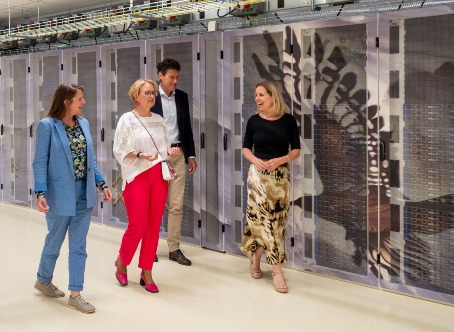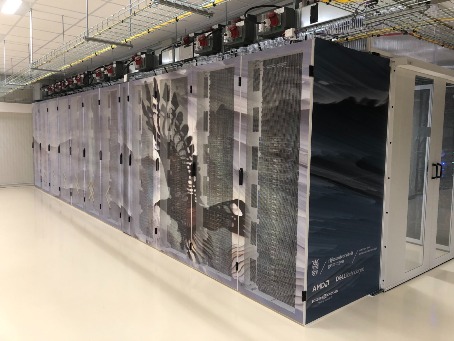Hábrók and CoDEX HPC cluster officially inaugurated

(Photo: Ronald Koelink)
On Thursday, June 15th, the Rector Magnificus of the University of Groningen, Cisca Wijmenga, officially inaugurated the new HPC clusters Hábrók and CoDEX. "A great event where my science with the help of Big Data coincides with my role as Rector Magnificus".
The HPC clusters will be used for large-scale computational work in support of scientific research at the university. Both computing clusters, located in the Coenraad Bron Center, have been built and tested over the past period.
Hábrók
The Hábrók cluster was delivered and co-designed by Dell and Bossers & Cnossen. It is controlled by Openstack which has been designed together with StackHPC. Researchers from almost all faculties make use of the HPC clusters. During the event, researchers Martijn Wieling (Faculty of Arts) and Thomas la Cour Jansen (Faculty of Science and Engineering) gave presentations on their research projects that utilized the HPC facilities. Rector Magnificus Cisca Wijmenga, in her previous position as a professor of Genetics at the UMCG, also extensively utilized the university's HPC resources.

State-of-the-art
The name Hábrók comes from Norse mythology and is known as the finest of hawks, representing an enhanced version of the previous computing cluster Peregrine. By utilizing the state-of-the-art hardware, the Hábrók cluster will provide significantly increased computing power and quadruple the storage capacity from 500 TB to 2.7 PB. This new cluster is particularly well-suited for working with large data sets or performing extensive simulations.
CoDEX
The CoDEX HPC cluster will be used to facilitate ongoing fundamental research in detecting the cosmological 21 cm signal from the early universe (between 100 million and one billion years after the Big Bang). This multinational project is led by scientists from the Kapteyn Astronomical Institute and ASTRON. CoDEX will process several petabytes of astronomical observations using the international LOFAR telescope.
Number crunchers
The University of Groningen (UG) has always profiled itself in the field of High Performance Computing (HPC) with state-of-the-art computers. In particular, Groningen's chemists and astronomers have developed a fondness for advanced computers, known as 'number crunchers,' since the late 1950s. The new computing clusters can expect enthusiastic usage by the RUG's large-scale computational researchers.
More news
-
15 September 2025
Successful visit to the UG by Rector of Institut Teknologi Bandung
